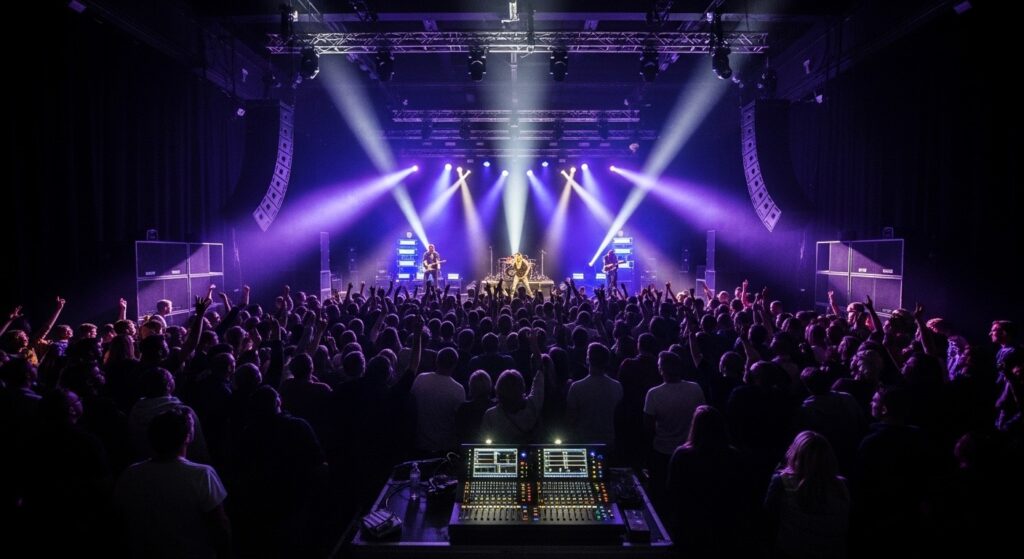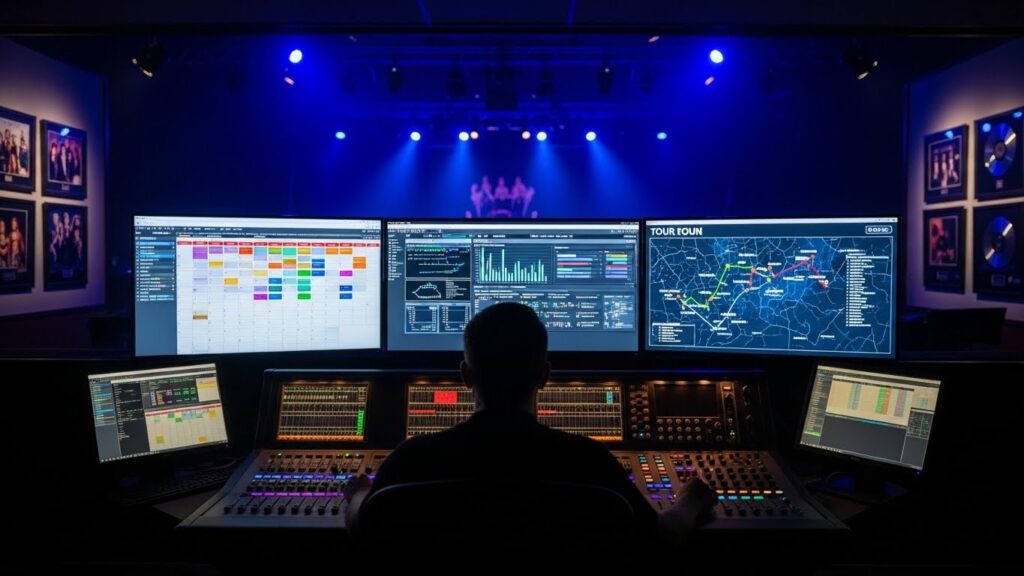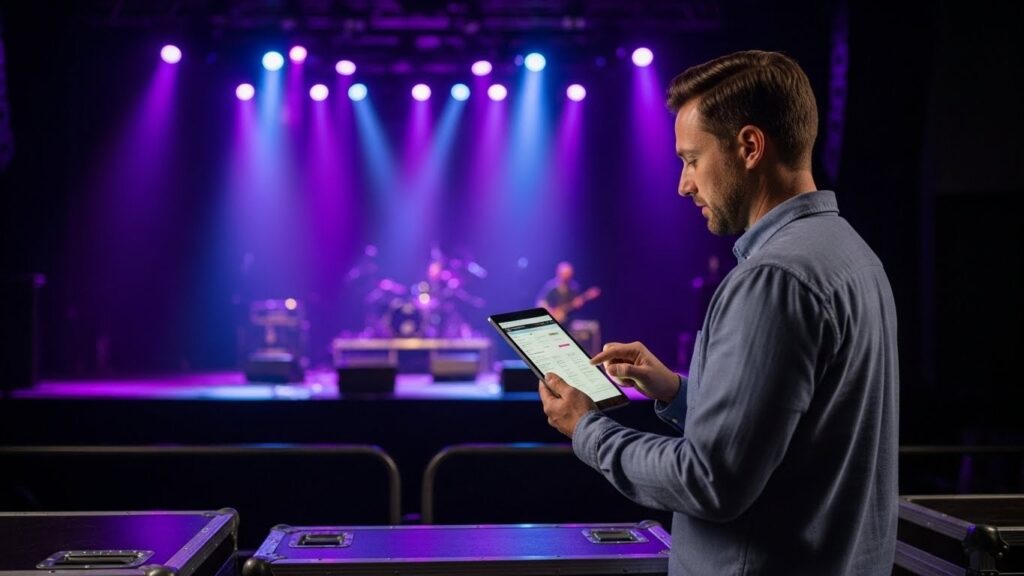
How to Effectively Market Your Music Venue: Real-World Examples That Work
Successful venue marketing examples show that strategic digital campaigns, community building, and data-driven approaches consistently fill seats and boost revenue.
- The Promontory built 30,000+ engaged followers through community-focused content and variety programming.
- Metropol Event Venue achieved 710% ROAS with targeted social campaigns and 814% ROAS through optimized search ads.
- Pabst Theater Group saves thousands annually while managing six venues through streamlined operational systems.
- The Rock & Roll Hall of Fame increased audience by 81% and sales by 12% using social media marketing.
The most effective venue marketing combines authentic storytelling, strategic partnerships, and measurable campaigns that turn casual music fans into loyal customers.
Successful live music marketing can mean the difference between packed houses and empty seats. Live music events saw a 4% increase in ticket sales for Q3 of 2025, highlighting the potential for venues willing to invest in strategic concert marketing. Effective music venue promotion ideas are about building a comprehensive strategy that consistently fills seats and creates sustainable growth.
Explore essential tactics and venue marketing examples that successful promoters use to boost ticket sales, build lasting relationships with music fans, and create an entertainment destination that keeps audiences coming back for more.
How to Lay the Groundwork for Successful Live Music Venue Marketing Examples
We get it; you’re ready to dive into the action. But before you hit the ground running, let’s talk strategy. A solid marketing foundation ensures every dollar pulls its weight and gives you the tools to measure your success with precision. Setting the stage right makes all the difference when it’s showtime.
Establishing Your Marketing Budget
Let’s talk money because smart spending is the backbone of a successful venue. Your earning potential hinges on key factors like your venue’s size, location, and the caliber of acts you can draw in. Nail these, and you’re setting yourself up for a serious payday.
Common costs like catering, insurance, advertising, staff, security, and performance fees all play into your budget planning.
Pro tip: Set aside a portion of your budget (around 10 to 15%) for those can’t-miss promotional opportunities that pop up out of nowhere. When that perfect marketing moment presents itself, you’ll be glad you have the resources ready to go.
The most successful venues typically allocate their marketing budgets across these key areas:
- Digital advertising (social media ads and Google Ads): 35–40%
- Traditional advertising (local radio, print): 20–25%
- Content creation (photos, videos, graphics): 15–20%
- Community engagement and partnerships: 10–15%
- Emergency fund for opportunities: 10%
Understanding these allocations helps you create a balanced marketing approach, but stay flexible. What works for one venue might need adjustment for another based on your unique market and audience. Advanced event management tools can simplify the budgeting process, offering real-time insights into marketing spend and ROI. With features designed to track expenses and analyze performance, these platforms help venue owners make smarter financial decisions and adapt strategies with ease.
Creating a Strategic Framework
Marketing without a plan is like performing without rehearsal. Sure, you might get through it, but why put yourself through that stress? Your strategy needs to be precise, actionable, and aligned with clear business objectives. Vague goals like “increase ticket sales” won’t cut it. It’s time to get specific. Think along the lines of “boost Thursday night attendance by targeting local college students with discounted drink specials and live acoustic sets.” That’s a goal you can build a campaign around.
It’s all about the details. Your strategy should highlight what makes your venue stand out, whether it’s a state-of-the-art sound system, an intimate atmosphere, or a prime location in the heart of the action. By leveraging tools that help identify your audience demographics, track event performance, and showcase your venue’s unique selling points, you can create campaigns that resonate and deliver results. Every move you make should reinforce what sets your space apart and draw the right crowd to your shows.
Digital Marketing Essentials
Ready to dive into the good stuff? Let’s talk digital marketing. Research indicates that one in three consumers use social media as the primary channel through which they discover and follow brands, and honestly, it’s not hard to see why. Your online presence is your virtual venue. Make it just as inviting as your physical space.

Maximizing Your Social Media Impact
Want to know what really sets successful venues apart on social media? It’s all about storytelling. Sure, you need to post your show calendars and ticket links, but the real magic happens when you share the story of your venue. Maybe it’s the history of your building, interviews with long-time staff members, or that crazy night when a famous artist showed up for an impromptu jam session. These are the posts that get shared, saved, and remembered.
Create themed content that showcases different aspects of your venue throughout the week:
- Memory Lane Monday: Share historical photos and stories
- Talent Tuesday: Spotlight upcoming artists
- Workshop Wednesday: Share industry insights
- Throwback Thursday: Highlight memorable shows
- Feature Friday: Showcase your staff and regulars
The key is consistency without getting stale. Mix up your content types while maintaining regular posting schedules. Pro tip: batch-create your content when you’re feeling inspired. It’s way better than scrambling for something to post at the last minute.
Email Marketing That Actually Works
Email marketing isn’t about bombarding your audience with endless show announcements. Smart venues know email is a powerful way to build genuine connections with fans. Start by segmenting your list based on the types of shows attendees prefer. Your metal fans probably don’t care about your jazz brunches (though wouldn’t it be interesting to find out?).
The magic lies in personalization. Use your ticketing and event data to craft tailored communications that resonate. For example, someone who’s hit up three punk shows in the last two months would love an exclusive heads-up about an upcoming hardcore festival. Effective live music venue marketing means offering value, not just promotions. Think welcome emails for new subscribers, VIP pre-sale access for loyal fans, and sharing local music news that strengthens their connection to your venue. Advanced tools can simplify this process by tracking preferences and automating personalized emails, ensuring every message feels relevant and authentic.
Creative Marketing Approaches
While digital marketing forms your foundation, it’s the creative approaches that help your venue stand out in the industry. Let’s explore some innovative ways to capture attention and build lasting connections with your audience.
Partnerships That Pack a Punch
Think beyond the usual suspects when it comes to partnerships. Sure, working with local radio stations is great, but have you considered teaming up with local food trucks for special pre-show dining experiences? Or partnering with craft breweries to create exclusive venue-branded beverages? Art galleries could create rotating installations in your lobby, while local music schools might help you discover amazing opening acts.
The best partnerships create win-win situations. That local coffee shop might love to create a signature drink named after your venue, while you promote their coffee bar during your daytime events. It’s all about finding creative ways to extend your reach while adding value for your audience. Advanced event management tools can help streamline these collaborations by organizing partner details, tracking mutual benefits, and identifying new opportunities to grow professional networks. With the right tools, venues can easily manage relationships and ensure every partnership runs smoothly.
Content That Converts
Creating content that drives ticket sales is about building anticipation and FOMO (Fear of Missing Out). Video content is particularly powerful, from quick artist introduction clips to time-lapse videos of stage setups. Interview snippets with performing artists, fan reaction compilations, and virtual venue tours all help potential customers connect with your space before they ever step through the door.
Don’t forget about user-generated content. Create Instagram-worthy photo spots in your venue, run photo contests with show tickets as prizes, and share fan photos and stories on your platforms. When your audience becomes part of your marketing team, magic happens.
Real-World Venue Marketing Examples That Deliver Results
Time to get specific. The best venue marketing examples are proven strategies that have generated actual results for real venues. These case studies showcase exactly how top-performing venues combine strategy, creativity, and smart tools to fill seats and build communities.

The Promontory (Chicago): Community-Driven Marketing Excellence
The Promontory in Chicago has mastered the art of community building through diverse programming and authentic engagement. Their secret weapon? Understanding that successful promoter marketing isn’t about selling tickets. It’s about creating a cultural destination people want to be part of.
Strategy: The venue hosts an eclectic mix of events, from Intonation Spring Showcases to intimate jazz performances, ensuring there’s something for every music lover. They focus heavily on building relationships rather than just broadcasting announcements.
Tools & Execution: Using platforms like Instagram and Eventbrite, The Promontory creates content that showcases the variety of their programming while maintaining a consistent brand voice. They leverage user-generated content from attendees and create behind-the-scenes content that makes fans feel like insiders.
Results: The venue has built an impressive social following with 30,000+ Instagram followers and 31,000+ Eventbrite followers. More importantly, their engagement rates are consistently high, with past attendees actively tagging friends in posts and showing up for new artists in the comments.
Key Takeaway: Variety in programming paired with consistent community engagement creates a loyal fanbase that promotes your venue organically.
Metropol Event Venue: Multi-Channel ROI Mastery
Metropol Event Venue faced stiff competition and needed a unified marketing strategy that would deliver measurable results across multiple channels. Their comprehensive approach became a textbook example of effective venue marketing.
Strategy: The venue implemented a multi-channel approach focusing on paid social media campaigns, Google search ads, and website optimization. They segmented audiences based on specific ballroom amenities and demographics to ensure relevant messaging.
Tools & Execution: Using Facebook and Instagram advertising platforms for visual storytelling, Google Ads for high-intent search traffic, and A/B testing for landing page optimization. They continuously monitored data to reallocate budget to the highest-performing campaigns.
Results:
- Paid social campaigns: 710% Return on Advertising Spend (ROAS)
- Google search campaigns: 814% Return on Advertising Spend (ROAS)
- Significant increase in qualified leads month over month
Key Takeaway: Data-driven optimization and multi-channel coordination can deliver exceptional ROI when executed systematically.
Rock & Roll Hall of Fame: Messenger Marketing Innovation
The Rock & Roll Hall of Fame revolutionized their customer engagement by implementing Facebook Messenger as a primary communication tool, creating a more personal connection with potential visitors and existing fans.
Strategy: Representatives used Messenger to provide personalized venue information, pricing details, event recommendations, and local area activities. The approach treated each interaction as a consultation rather than a sales pitch.
Tools & Execution: Facebook Messenger for Business, integrated with their existing ticketing system and event calendar. Staff were trained to provide helpful, conversational responses that added value beyond basic venue information.
Results:
- 81% increase in audience size
- 12% increase in sales from prospects
- Maintained high engagement, even on holidays
Key Takeaway: Personal, helpful communication through messaging platforms can boost both audience growth and conversion rates.
Pabst Theater Group: Operational Excellence Through Smart Technology
Pabst Theater Group operates six venues in Milwaukee, ranging from a 400-capacity club to a 4,000-seat theater, putting on thousands of events annually. Their transformation showcases how the right technology platform can streamline operations while improving marketing effectiveness.
Challenge: Managing multiple venues with different capacities and audiences while coordinating thousands of events required better organization and data-driven decision-making. Their old methods were no longer effective for their growing operation.
Strategy: Since 2020, Pabst has integrated all aspects of their operation into one comprehensive platform, from offer generation to financial reporting and team communication.
Tools & Execution: Using an all-in-one booking system, they now manage calendars, generate offers, track financials, settle shows, and analyze data across all six venues. They were early adopters of analytics, which provides ticket sales data to help mitigate risk on offers.
Results:
- Thousands of dollars saved annually through streamlined operations
- Eliminated errors in booking and financial processes
- Enhanced data analysis capabilities for better decision-making
- Improved team coordination across multiple venues and events
Key Takeaway: Operational efficiency directly impacts marketing effectiveness. When your backend systems work seamlessly, your team can focus on creating compelling experiences and building audience relationships.
Lessons from Successful Venue Marketing Examples
These venue marketing examples share several key characteristics that make them effective. First, they prioritize authentic community building over aggressive sales tactics. Second, they use data to inform decisions and continuously optimize their approaches. Third, they create experiences that attendees want to share, turning customers into active promoters.
The most successful live event marketing strategies also integrate multiple channels rather than relying on a single approach. Whether it’s combining social media with email marketing or pairing streamlined operations with customer engagement tools, the best results come from coordinated efforts that reinforce each other.
Finally, the most effective music venue promotion ideas recognize that marketing creates systems that support every aspect of the customer experience, from discovery to purchase to post-event engagement.
Implementation & Success Metrics
Here is where strategy turns into action. Great music venue promotion ideas are just the starting point. It’s all about execution. Start by building a 12-month marketing calendar that maps out major show announcements, seasonal promotions, and community events. Work backward from your big events to ensure you’ve got enough lead time to generate buzz and build momentum. A well-organized calendar keeps your live music venue marketing efforts on track and aligned with your goals.
When it’s time to measure success, focus on the metrics that matter. Track ticket sales velocity, email open and click rates, and website conversions to see where your efforts are paying off. Dive deeper by analyzing customer acquisition costs by channel and understanding the lifetime value of customers based on show genres.

Using live music event management tools, you can automate your marketing calendar, monitor key performance metrics in real time, and identify what’s driving results. The right tools give you the insights needed to double down on what works and ditch what doesn’t.
FAQ
How much should I invest in venue marketing examples like these successful campaigns? Most successful venues allocate 15-25% of total revenue to marketing. The venue marketing examples here show strong ROI. Start with a modest budget to test channels, then scale what works.
How long does it take to see measurable results from live event marketing strategies? Social media and email marketing show improvements in 4-6 weeks. Community-building efforts take 3-6 months. Building a loyal fanbase requires 6-12 months of consistent effort. Track leading indicators (engagement rates, followers) rather than just ticket sales.
Which music venue promotion ideas should I prioritize when starting out? Focus on three core areas: strong social media presence, basic email marketing segmentation, and showcasing your venue’s unique value on your website. These fundamentals support all other marketing efforts. Once established, expand into partnerships and user-generated content campaigns.
Elevate Your Venue Marketing Strategy
Managing live music venue marketing without the right systems is where many venues struggle. Tracking what drives ticket sales, coordinating a content calendar, and keeping your team aligned can feel overwhelming. Effective marketing requires organization, automation, and real-time insights to stay ahead in a fast-paced industry.
That’s where Prism comes in. Designed for venue owners and promoters, it brings everything together (tracking, scheduling, and team collaboration) all in one platform. With Prism, you can streamline your marketing efforts, fill more seats, and focus on what matters most: delivering unforgettable live music experiences. Get started today and see how Prism can transform your venue marketing strategy.

Matt Ford is the founder and CEO of Prism.fm, an Austin-based software company revolutionizing live music event management. With a background in entrepreneurship and a degree from the University of Wisconsin-Madison School of Business, Ford combined his self-taught coding skills with firsthand experience as a concert promoter to address the inefficiencies he observed in the industry. In 2018, he launched Prism.fm, an all-in-one platform designed to streamline operations for venues, promoters, and agencies by replacing cumbersome spreadsheets with integrated tools for booking, financial tracking, and contract management. Under his leadership, Prism.fm has grown significantly, achieving $3 million in annual recurring revenue post-COVID and securing over $15 million in funding . Ford’s commitment to building user-centric solutions has positioned Prism.fm as a trusted partner for over 1,500 venues and promoters worldwide.



